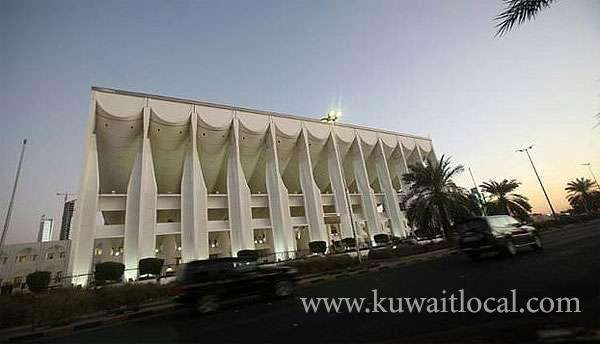Latest News
- Pay Electricity Bills Before Government Transactions Under A New...
- MoCI Cracks Down On Commercial And Retail Fraud
- Four People Were Injured In A House Fire In Raqqa
- Egyptian Deported
- Juwaihil Sentenced To 3 Years For Insulting The Tribe
- Kuwait Issues 1,895 Private Company Licenses
- Passengers Drop At Kuwait Airport
- Six Vehicles Collided Near ‘360 Mall’ On Sixth Ring Road
- Uzbekistan President Meets Kuwaiti Foreign Minister During GCC-C...
- Ministry Of Social Affairs Considers Investment Within Headquart...
- Kuwaiti Lawyers Association Launches 'Paperless Justice' Initiat...
- Parliamentary Committees Coordination: MPs Express Preferences F...
Second Reads, Grillings Up For Next Assembly Session

The National Assembly, during its upcoming session this Tuesday, is scheduled to discuss the interpellation submitted by MPs Mohammed Hayef and Mohammed Al-Mutair against the State Minister for Cabinet Affairs Anas Al-Saleh and the interpellation submitted by MPs Riyadh Al-Adsani, Adel Al-Damkhi and Mohammed Al-Dalal against Minister of Information Mohammad Al-Jabri, along with various incoming letters and parliamentary requests.
The first interpellation submitted against Minister Anas Al-Saleh consists of three points – destruction of state institutions, injustice and inequality in the employment of citizens especially in the Fatwa and Legislation Department, and violation of state tenders and squandering of public funds.
On the other hand, the four points addressed in the interpellation submitted against Minister Mohammed Al-Jabri include abuse of authority and legal infractions committed by Public Authority for Agricultural Affairs and Fish Resources (PAAAFR), violations at Ministry of Communications and Public Authority for Sports, and issues with parliamentary questions.
As for legislation, the National Assembly is scheduled to take up second readings of both the land registry bill and the common protocol for combatting commercial fraud in GCC nations, as well as expedite discussions on the 42nd report of the health, social and labor affairs committee concerning the governmental bill on charity work and the legislative proposal for regulating charity operations.
Meanwhile, MP Al-Humaidhi Al-Subaie revealed that he will refrain from submitting his interpellation against the Minister of Commerce and Industry Khalid Al- Roudhan until the Parliament’s committee for the protection of public funds completes its report on his previous interpellation against the minister. The MP said he met the minister and presented him with the intended interpellation, stressing that this initiative is strictly aimed at reform and not political ruin of the minister.
He indicated that the minister assured him about the presence of multiple initiatives aimed at resolving the raised issues, and promised to cooperate with the National Assembly for holding concerned officials accountable, resolving issues and providing any information required by the committee. Furthermore, the Parliament’s committee for public utilities has completed its report on the increase in the commercial rents at Mubarakiya Market. As per the report, the cultural value and national identity of the market outweighs the current annual income stipulated in the contract with the managing company.
The report explained that the government signed a contract with Real Estate House Co on February 2017 for the management of Mubarakiya Market, as well as the fish, meat and vegetable markets for a yearly income of KD 3,671,000.
This contract was executed in accordance with the public-private partnership law No. 116/2014 which allows the company contracted by Ministry of Finance to the rent values, as the ministry is only limited to the implementation of the contract, follow up the project, and collect revenues, while the Kuwait Authority for Partnership Projects tends to all the procedures and placement certifications.
The ministry previously initiated a dialogue with the company in a bid to curb any increase in the rent values, but the company was adamant about its decision, rendering the ministry incapable of preventing such an action in accordance with the law and the contract. The government stressed that it is obligated to put up investment on Mubarakiya Market for bidding whenever a contract ends, but the committee’s report refuted such a claim, as the ministry is entitled to directly manage the market.
Alternatively, after the previous contract ended on April 2014, the government could have added any number of articles and clauses to the new contract for protecting shop owners from any financial harm. It was also noted that this increase in rent values carries with it multiple consequences including increase in prices of services and commodities in the market.
This could in turn lead to change in the cultural and traditional nature of the market, which has been its key characteristic in attracting the general public and tourists, especially since there are approximately 529 shops subjected to this action.
Trending News
-
 Eid Al Fitr 2024: Crescent Moon Not Sighted In Sau...
08 April 2024
Eid Al Fitr 2024: Crescent Moon Not Sighted In Sau...
08 April 2024 -
 Kuwaiti Cabinet Plans Public Holiday On April 4, 2...
01 April 2024
Kuwaiti Cabinet Plans Public Holiday On April 4, 2...
01 April 2024 -
 Kuwait Implements Home Biometrics Services Ahead O...
14 April 2024
Kuwait Implements Home Biometrics Services Ahead O...
14 April 2024 -
 MOI Urges Pre-booking For Biometric Appointments V...
02 April 2024
MOI Urges Pre-booking For Biometric Appointments V...
02 April 2024 -
 When Will Eid Al Fitr 2024 Take Place In Qatar, Ba...
08 April 2024
When Will Eid Al Fitr 2024 Take Place In Qatar, Ba...
08 April 2024 -
 On Sunday, The Meteorological Department Warns Of...
07 April 2024
On Sunday, The Meteorological Department Warns Of...
07 April 2024 -
 Kuwait Airways Provides Update On Flight Schedule...
14 April 2024
Kuwait Airways Provides Update On Flight Schedule...
14 April 2024 -
 Winners Of Kuwait National Assembly 2024 Elections
06 April 2024
Winners Of Kuwait National Assembly 2024 Elections
06 April 2024 -
 Gathering For Eid Al-Fitr Prayers: Kuwaiti Citizen...
10 April 2024
Gathering For Eid Al-Fitr Prayers: Kuwaiti Citizen...
10 April 2024 -
 Transforming Kuwait's Public Transport: The Digita...
07 April 2024
Transforming Kuwait's Public Transport: The Digita...
07 April 2024












Comments Post Comment